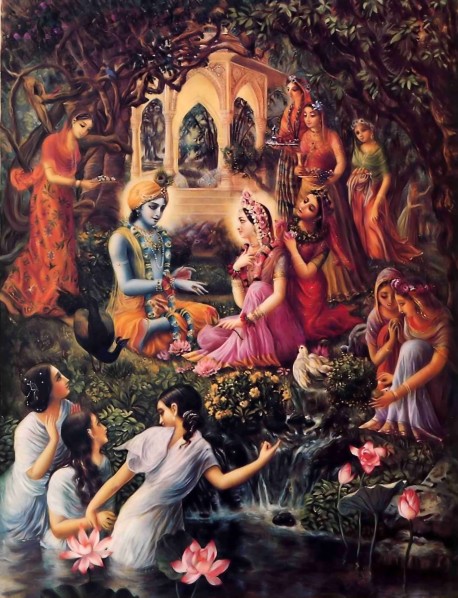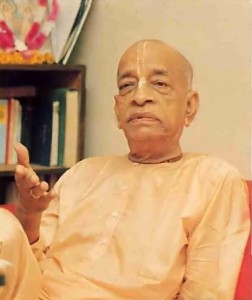Part 1: Dealing With the Existential Dilemma
 Hayagriva dasa: Soren Kierkegaard was a mid-nineteenth-century Danish philosopher who is generally regarded as the father of existentialism. A devout Christian, he believed that religious truth is not innate within man, and that man must therefore receive this truth from God. According to Kierkegaard, God would overawe us if He Himself came to teach, so He comes instead as His own servant in human form. For a Christian, this teacher is Jesus Christ.
Hayagriva dasa: Soren Kierkegaard was a mid-nineteenth-century Danish philosopher who is generally regarded as the father of existentialism. A devout Christian, he believed that religious truth is not innate within man, and that man must therefore receive this truth from God. According to Kierkegaard, God would overawe us if He Himself came to teach, so He comes instead as His own servant in human form. For a Christian, this teacher is Jesus Christ.
Srila Prabhupada: Generally men are on the animal platform. But when a man’s consciousness becomes a little advanced, he can be educated in the understanding of God through the teachings of spiritual authorities. That is the Vedic system. In the human form the living entity is sometimes very inquisitive and wants to understand God. That inquisitiveness is technically called brahma-jijnasa, interest in the Absolute, which is possible only in the human form of life.
Now, if one is actually anxious to know about God, he has to approach a guru, who is God’s servant and His representative. Unless one approaches a bona fide guru, he cannot understand the nature of God, or man’s relationship with Him. So accepting a guru is not a fashion but a necessity. However, a guru is not a person who simply manufactures gold or juggles words just to attract foolish people and make money. An actual guru is one who is fully trained in the ocean of spiritual knowledge, or Vedic knowledge. Vedic words are not ordinary material sound vibrations. They are completely spiritual. The Hare Krishna maha-mantra, for instance, is a purely spiritual sound. Once a person is fully trained in the ocean of spiritual sound, he becomes a guru and is no longer interested in material life. In fact, the definition of guru is “one who is no longer interested in material things.” He has taken shelter of the Supreme Lord, and his material desires have completely ceased. One should approach such a bona fide guru, surrender unto him, serve him, and then question him about God and our relationship with God.
Hayagriva dasa: Is Kierkegaard correct in maintaining that man would be overawed if God, as He is, came to teach? Didn’t Krishna, as He is, come to teach the Bhagavad-gita?
Srila Prabhupada: Krishna came as He is, but people misunderstood Him because He appeared as a human being. Consequently, they could not surrender to Him. Therefore Krishna came later as a devotee, Sri Caitanya Mahaprabhu, to teach men how to approach God. Sri Caitanya Mahaprabhu taught the very same philosophy that Krishna taught in the Bhagavad-gita. However, instead of coming as Krishna, Lord Caitanya came as Krishna’s devotee. Rupa Gosvami [an exalted devotee who in the sixteenth century wrote some of the most important books on devotional yoga] appreciated Caitanya Mahaprabhu as the most munificent incarnation, because He gives not only Krishna but also pure love of Krishna (namo maha-vadanyaya Krishna-prema-pradaya te). In exchange for Himself, Krishna demands full surrender from the devotee. But Caitanya Mahaprabhu, without making any demands, gave pure love of Krishna. Because we are all His sons, Krishna the Supreme Lord is affectionate towards us. He sees us rotting in this material world, and He comes Himself—or He comes as His devotee—and leaves His instructions. Krishna is always anxious to enlighten the human beings and show them how to return home, back to Godhead.
Hayagriva dasa: Kierkegaard thought that the ordinary man does not wish to have a personal relationship with God. Kierkegaard wrote, “The truth is that there are no longer men living who could bear the pressure and weight of having a personal God.”
Srila Prabhupada: Yes, a personal God makes demands, just as Krishna demands in the Bhagavad-gita [9.34],
man-mana bhava mad-bhakto
mad-yaji mam namaskuru
mam evaisyasi yuktvaivam
atmanam mat-parayanah
“Always think of Me and become My devotee. Worship Me and offer your homage unto Me. Being completely absorbed in Me, surely you will come to Me.” This is God’s demand. And if we carry it out we attain perfection. Tyaktva deham punar janma naiti mam eti: Krishna clearly states here that when a devotee gives up his material body, he does not accept another—he returns back to Godhead in his original spiritual body.
Hayagriva dasa: Kierkegaard observed three basic stages in life: the aesthetic stage, the ethical stage, and the religious stage. In the first stage—the aesthetic stage—a person may be either a hedonist in search of sensual pleasure or an intellectual interested in philosophical speculation. Kierkegaard says that both are uncommitted. Neither has any ultimate goal in life.
Srila Prabhupada: How can a philosopher have no ultimate goal?
Hayagriva dasa: Kierkegaard says that people on this platform are not really philosophers but simply mental speculators. They become bored with themselves, and their lives become empty of meaning and full of despair.
Srila Prabhupada: Despair is a result of impersonalism and voidism. Impersonalists and voidists must necessarily be overcome by despair—because they are always disgusted with their lives, and because they do not know the goal of life. When one has no goal he becomes disappointed, and that disappointment is the cause of despair.
Hayagriva dasa: Kierkegaard sees this despair as the first stepping-stone towards self-realization. Understanding that the aesthetic life ends in despair, in hopelessness, a person abandons this type of life for the next stage.
Srila Prabhupada: We agree with this. According to the Vedanta-sutra, people begin to inquire about self-realization after they have worked very hard and still have not attained life’s goal. At this point people begin to think, “What is the purpose of life?” That is called brahma-jijnasa, inquiry into the ultimate truth of life. Such an inquiry is natural, and it is necessary for further development.
Hayagriva dasa: According to Kierkegaard, to attain self-realization we must confront certain choices—we must become aware that life is an “either/or” decision. Realizing this, we advance to the second stage—the ethical stage. At this point we take an active part in dealing with life rather than aimlessly taking pleasure from life. We may act piously or attempt humanitarian deeds.
Srila Prabhupada: But what is the ultimate goal of these decisions? Why should people become moral? Simply to feed the poor and open hospitals?
Hayagriva dasa: For Kierkegaard, the important thing is not so much what one chooses, but how one makes the choice. Through choosing one discovers his own integrity.
Srila Prabhupada: But it is not clear how a person can make the right decision. One man may choose to slaughter, and another man may choose to help others. Or a man may give charity to others and yet at the same time encourage killing animals. For instance, on the one hand Vivekananda [an impersonalist yogi who came to America from India at the turn of the century and lectured widely here] was advocating feeding the poor, but on the other hand he was suggesting feeding them with Mother Kali’s prasada—the flesh of bulls. So what kind of ethics is that? What is the value of ethics if it is based on imperfect knowledge?
Hayagriva dasa: Kierkegaard did not give so much importance to the basis of the decision.
Srila Prabhupada: But if one’s decision is not based on truth, what is its value? You must go further than the mere making of decisions. You must know which is the proper decision to make.
Hayagriva dasa: Kierkegaard would say that by turning inward you would naturally make the proper decision. This “turning inward” entails self-knowledge.
Srila Prabhupada: But of what value is that inwardness? You may simply think, “I will protect my brother by killing someone.” What is the ethics involved? You must have some standard by which to make the right decision.
Hayagriva dasa: Kierkegaard’s standard would be “choose yourself”.
Srila Prabhupada: But without knowing yourself, how can you choose yourself? And how can you know yourself unless you go to one who knows the self and the Supreme Self perfectly? That means you must go to a bona fide spiritual master. Most people think that they are their body. What kind of self-knowledge is this? yasyatma-buddhih kunape tri-dhatuke: “If one thinks he is his body, he is no better than an ass.” What is the value of an ass’s philosophy?
Hayagriva dasa: Kierkegaard’s philosophy emphasizes the act of deciding. The decision itself is not so important.
Srila Prabhupada: But unless we know the aim of life, how can we make the right decision? It is simply childish to say that by choosing either this or that we become enlightened. A child chooses this or that—sometimes he plays with one toy and sometimes with another—but where is his enlightenment? Animals also make their decisions. The ass decides to eat a morsel of grass and work all day carrying this or that. If the basis of our decision is not important, why not decide for unrestricted sense gratification?
Hayagriva dasa: Kierkegaard would say that unrestricted sense gratification leads to boredom, and ultimately to despair.
Srila Prabhupada: But if you think that sense gratification is the aim of life, then it is not boring to you. If you choose according to your whims, you can make any decision.
Hayagriva dasa: Kierkegaard would say that we should choose not by whim but by an inward, objective, passionate search. Then the truth will naturally emerge.
Srila Prabhupada: But a Bowery bum may make a passionate decision to purchase a bottle of whiskey as soon as he gets some money.
Hayagriva dasa: Kierkegaard would say that in his decision there is no commitment to a higher ethic. There is simply the desire for sense gratification. If his decision were made on the ethical level, he would take up a good cause and act on that basis.
Srila Prabhupada: But such “good causes” are relative. You may consider one thing to be a good cause, and I may consider another. Who will ultimately decide?

Hayagriva dasa: Kierkegaard believed that if we begin to anticipate death, we will make the right decisions. In other words, we should act in such a way that we consider each act to be our last. In this way, he believed, the truth will emerge.
Srila Prabhupada: Every man should think, “I do not wish to die, but death is overcoming me. What is the cause of this? What should I do?” No one wants to die, but death overcomes everyone. No one wants to be diseased, but diseases are inevitable. These are real human problems that cannot be solved by making some whimsical decision. We should decide, “I do not wish to suffer, but suffering is coming upon me. Now, I must find a solution to this problem.” This is the real decision we have to make. We must decide to put a permanent end to suffering—to birth, old age, disease and death. We should understand that the body exists for a few years and then is doomed to perish. We should also understand that the body is external and that we should not make our decisions on the basis of the body. Rather, we should make our decisions on the basis of the soul.
Hayagriva dasa: For Kierkegaard, the third and highest stage of life is the religious stage. On this platform a man submits himself to God and obeys God totally.
Srila Prabhupada: In other words, this is the stage of Krishna consciousness. We agree that Krishna consciousness is the topmost stage of life.
Hayagriva dasa: Kierkegaard thought that in the religious stage, there is intense suffering—suffering comparable to that of Job.
Srila Prabhupada: Why is this? If one is Krishna-conscious, why should he suffer?
Hayagriva dasa: Kierkegaard was a Christian, and he emphasized the importance of suffering. The Bible says that Christ suffered for our sins, and Kierkegaard believed that the process of overcoming sin involves suffering.
Srila Prabhupada: But that is a wrong theory. If Christ is God or the son of God, why should he suffer? What kind of God is subjected to suffering? Why should either God or man suffer? The whole point is that if there is suffering, you must put an end to it.
Hayagriva dasa: For Kierkegaard, religious commitment is epitomized by inward suffering.
Srila Prabhupada: No. Suffering arises because we identify with the body. When a person’s car is damaged in an automobile accident, he may not actually be injured, but because he identifies himself with matter—with his car—he suffers. Similarly, the spirit soul is riding within the car of the material body, and because the spirit soul identifies himself with the body, he suffers when the body is injured or becomes sick or dies. But because the Krishna-conscious man is always in full knowledge and is always transcendental to the material world, he never suffers. Whether we suffer or not depends on our knowledge.
Hayagriva dasa: But don’t penance and austerity involve suffering?
Srila Prabhupada: No. For those who are advanced in knowledge, there is no suffering. Of course, there may be some bodily pain, but a person in knowledge understands that he is not the body. Therefore, why should he suffer? He thinks, “Let me do my duty. Hare Krishna.” That is the advanced stage of Krishna consciousness. Suffering is due to ignorance.
Hayagriva dasa: But don’t we have to give up bodily comforts to serve God?
 Srila Prabhupada: Rupa and Sanatana Gosvamis were high government ministers, but they abandoned their material opulence to bestow mercy upon the common people. So they wore only loincloths and slept under a different tree every night. Of course, foolish people might say that they were suffering, but actually they were merged in the ocean of transcendental bliss. They simply engaged their minds in thought of Krishna’s pastimes with the gopis. And from day to day they wrote books about these pastimes. There was no question of their suffering, although a fool may think, “Oh, these men were ministers, high government officials, and they were so comfortable with their families and homes. Now they have no home, and they are going about in loincloths, eating very little.” A materialist would think the Gosvamis were suffering. But they were not suffering—they were enjoying.
Srila Prabhupada: Rupa and Sanatana Gosvamis were high government ministers, but they abandoned their material opulence to bestow mercy upon the common people. So they wore only loincloths and slept under a different tree every night. Of course, foolish people might say that they were suffering, but actually they were merged in the ocean of transcendental bliss. They simply engaged their minds in thought of Krishna’s pastimes with the gopis. And from day to day they wrote books about these pastimes. There was no question of their suffering, although a fool may think, “Oh, these men were ministers, high government officials, and they were so comfortable with their families and homes. Now they have no home, and they are going about in loincloths, eating very little.” A materialist would think the Gosvamis were suffering. But they were not suffering—they were enjoying.
Hayagriva dasa: Many of the Christian monks and ascetics emphasized suffering. They thought to abandon worldly life means to abandon pleasure and take on suffering.
Srila Prabhupada: This shows that they have a poor fund of knowledge. They have developed this philosophy after the demise of Jesus Christ. It is more or less concocted.
Hayagriva dasa: Aside from suffering, Kierkegaard emphasized the importance of love in the religious life. In his book Works of Love, Kierkegaard considered God to be the hidden source of all love. He wrote: “A man must love God in unconditional obedience and in adoration. It would be ungodliness if any man dared to love himself in this way, or dared to permit another man to love him in this way…. You must love God in unconditional obedience even if that which He demands of you may seem injurious to you, . . . for God’s wisdom is incomparable with respect to our own. . . .”
Srila Prabhupada: That is also the instruction of the Bhagavad-gita. God demands that we give up all our plans, as well as the plans of others, and accept His plan:
sarva-dharman parityajya
mam ekam saranam vraja
aham tvam sarva-papebhyo
moksayisyami ma sucah
“Abandon all varieties of religion and just surrender unto Me. I shall deliver you from all sinful reaction. Do not fear” [Bg. 18.66]. If we fully depend on Krishna, the Supreme Personality of Godhead, He will guide us home.
Hayagriva dasa: In defining love, Kierkegaard said, “Love is a matter of conscience, and hence it is not a matter of impulse and inclination; nor is it a matter of emotion, nor a matter for intellectual calculation…. Christianity really knows only one kind of love: spiritual love.”
Srila Prabhupada: Yes, love in the material world is impossible, for in the material world, everyone is interested only in his own sense gratification. The love experienced between a man and a woman is not actually love but lust, because both parties are interested only in their own sense gratification. Love means that one does not think of his own sense gratification but of the sense gratification of his beloved. That is pure love. But that pure love is not possible in the material world. When we speak of love in the material world, we are actually misusing the word. Lustful desires take the place of real love.
However, we do see examples of pure love in the Vedic descriptions of Vrndavana village. There the men, women, animals, fruits, flowers, water, and everything else exist only for the sake of loving Krishna. They are not interested in any return from Krishna. Now, that is real love (anyabhilasita-sunyam). On the other hand, if we love God with some motive, that is material love. Pure love means that we are simply interested in satisfying the desires of the Supreme Personality of Godhead. Thus real love—individual, collective, or any other kind—applies only to God. Krishna, the Supreme Personality of Godhead, is the supreme object of love, and this love can be expressed through admiration, service, or friendship. Or we can love Him as our child or conjugal lover. There are five basic relationships expressing true love of Godhead.
Hayagriva dasa: For Kierkegaard, love of God is the decisive factor, and from it stems love of our neighbor. He wrote, “If you love God above all else, then you also love your neighbor, and in your neighbor every man…. To help another man to love God is truly to love the other man; to be helped by another man to love God is truly to be loved.”
Srila Prabhupada: This is the basis of our Krishna consciousness movement. We are learning how to love God, and we are teaching the same principle to the whole world. If love of God is taught by a religion, that religion should be considered first class—be it Christian, Hindu, Muslim, or whatever. The test of a religion is this: “Have the followers learned how to love God?” God is the center of love, and since everything is God’s expansion, the lover of God is a lover of everyone. A lover of God does not discriminate by thinking only man should be loved and given service. No. He is interested in all living entities, regardless of the forms in which they happen to be existing. A lover of God loves everyone, and his love reaches everyone. When you water the root of a tree, you are nourishing all the parts of the tree—the trunk, branches, twigs, and leaves. When you give food to the stomach, you are satisfying the entire body. And when you love God, you love everyone and everything. [To be continued]


Leave a Reply